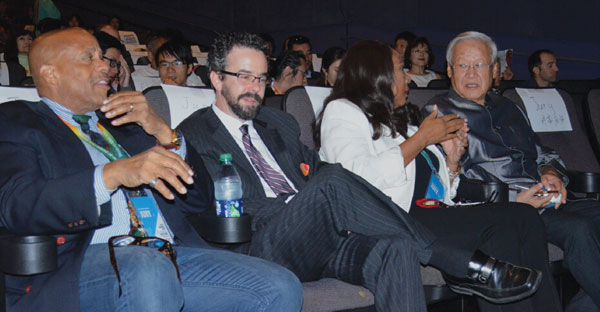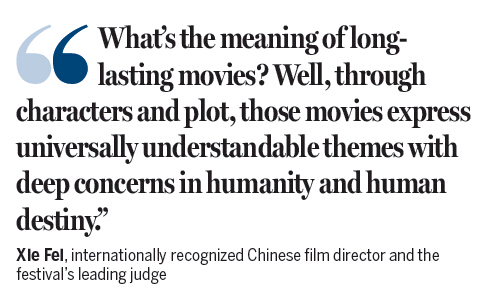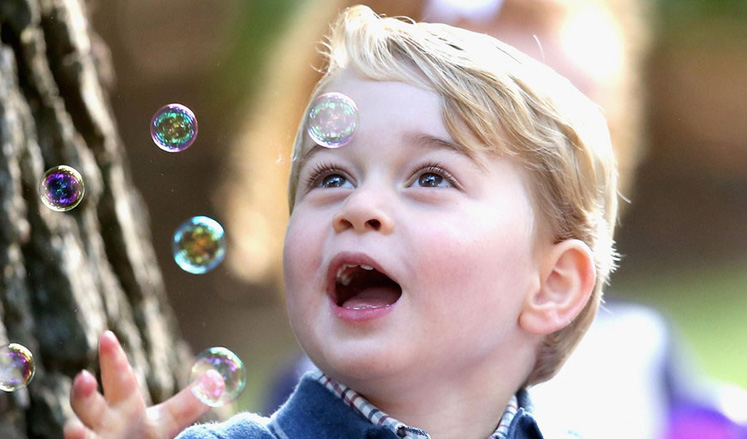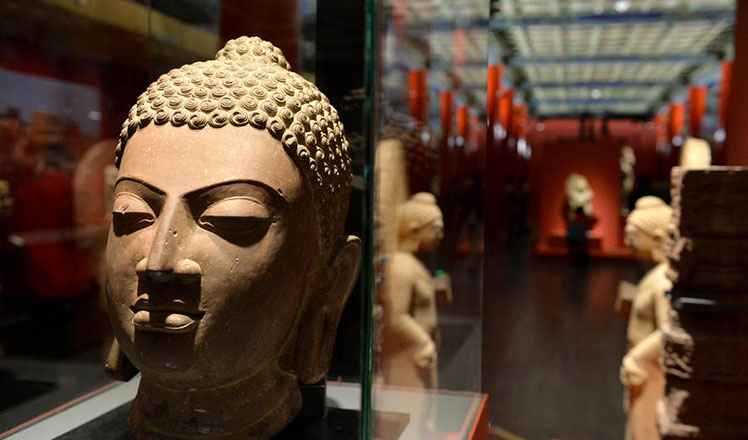DC Chinese Film Festival: kaleidoscope of China
Updated: 2016-09-30 23:48
By China Daily in Washington(chinadaily.com.cn)
|
||||||||
 |
|
The third DC Chinese Film Festival juries talk about the films at the closing ceremony of the festival on Sunday in Washington. From left are: Russell Williams, a full-time professor of film and media arts at American University; Tom Vick, the curator of film at the Freer and Sackler Galleries; Anita Long, the president of Women in Film and Television Houston, and Xie Fei, an internationally recognized Chinese film director and the festival’s leading judge. Yuan Yuan / For China Daily |
For a week, Washington audiences got to watch 67 films from nine countries and regions covering love, spirituality, education, environment, lifestyle, regional development, welfare, social justice, post-war trauma and, of course, traditional cultural heritage — almost all the aspects of today’s Chinese society one can think of.
“Through the lens of the filmmakers, I get to learn about China’s recent changes in an artistic way and to recognize trends of the Chinese film industry,” said Yang Rong, who came to the United States from Beijing 30 years ago.
The DC Chinese Film Festival, a non-profit initiative that was held in the nation’s capital from Sept 19-25, is the city’s leading showcase for Chinese-related art films.
This year, 54 main competition films, in which filmmakers tried out new themes and techniques, along with five special screenings and eight community screenings, covered a variety of social issues.
Founded in 2011, the Chinese festival has “grown substantially” in size and scope, said festival director Geoffrey Cai.
All films in the festival’s main competition this year were selected from 741 submissions from nearly 40 countries by “a mixture of around 70 percent of film professionals and 30 percent of general audiences”, said Tian Chuyin, director of programming for the festival.
Films in the main competition must have been produced after 2014 and without a previous official release, she said.
“Nominations of the film festival should at least meet one of the three requirements, to include Chinese cast members in its main crew, be related to Chinese culture or have Chinese (Mandarin or other dialects) as its main language,” Tian said.
The nominations were divided into six categories: documentary feature, documentary short, narrative feature, narrative short, experimental short and animation short.

Seven juries give awards to the best films in each category and three special awards. Two audience special awards were given based on their votes.
Meredith Dalton volunteered for the festival as an opportunity to watch the films.
“This is the first time I’ve noticed the festival,” Dalton said. “I think it’s a very diverse showcase. It’s too bad (that) it’s every two years instead of every year, but hopefully in the near future, they’ll be able to do it more frequently.”
Dalton felt strongly about the film Twenty Two, a look at the experiences of the last surviving fomer “comfort women” in China.
“This is a new topic for me, and this was a very well-done film about a generation that was passed,” she said. “It’s nice that they’ve been able to capture these women. They are the records for future generations.”
This year’s leading film judge, Chinese film director Xie Fei, interacted with the audience after the special screening of his 1995 film The Mongolian Tale.
“When I was a student, one of my mentors kept telling us to shoot films that would last long,” Xie said. “What’s the meaning of long-lasting movies? Well, through characters and plot, those movies express universally understandable themes with deep concerns in humanity and human destiny.”
Xie also mentioned that films can capture unique nationalities and regions that are experiencing dramatic change and even vanishing.
“We tried to make the jury team a diverse one with three Asians, two African Americans and two white,” Tian said.
“This is interesting for me to see younger filmmakers who may just be starting out with short films,” said another judge, Tom Vick, the curator of film at the Freer and Sackler Galleries. “It’s a chance to really get an idea of what young filmmakers are working on, to see a kind of potential among them.”
Chen Xiaoxiao brought the festival her master’s graduation film, a 30-minute documentary titled A Place Called Home, depicting the daily lives of abandoned children residing at the Zhang Jiakou Welfare Center in China.
The film takes an unflinching look at an institutional world where heartbreak and tragedy, though routine, co-exist with the simplest but unexpected daily progress.
“I’m so profoundly moved by the movie,” said JoAnn Sainz, an educational consultant. “It’s so exclusive, and there’s nothing more superior than a sense of mission.”
The winning films were announced on Sunday evening at the festival’s closing ceremony.
Forefinger Town won both the Best Animation Short and the Audience Award.
Chen Yujie, the director of the Best Narrative Feature Lost Daughter, was the only winner in attendance to accept an award.
“Films presented here are very different from the commercial films we see in the nowadays Chinese mainstream film market,” Xie said. “And I think screening is actually more important for the filmmakers than actually winning an award.”
“This film festival is a great opportunity for District residents and visitors to experience cultural diversity through film,” said Muriel Bowser, mayor of the District of Columbia, in a letter to the festival.
“Hopefully, the festival is able to draw greater attention in the future,” Yang said. “Around the DC area, specialists in Chinese studies, students majoring in international relations, families with adopted Chinese children and those who practice speaking Chinese are all potentially interested in these films.”
Yuan Yuan in Washington contributed to the story

 Top 10 Chinese cities with 'internet plus transportation’
Top 10 Chinese cities with 'internet plus transportation’
 New energy cars shine at Paris Motor Show
New energy cars shine at Paris Motor Show
 23 baby giant pandas make debut in Chengdu
23 baby giant pandas make debut in Chengdu
 Heritage list salutes Chinese architecture
Heritage list salutes Chinese architecture
 Happy hour for prince and princess in Canada
Happy hour for prince and princess in Canada
 Chinese and Indian sculptures on display at the Palace Museum in Beijing
Chinese and Indian sculptures on display at the Palace Museum in Beijing
 Rescue work at the typhoon-hit provinces
Rescue work at the typhoon-hit provinces
 Wonderland-like sunrise in East China
Wonderland-like sunrise in East China
Most Viewed
Editor's Picks

|

|

|

|

|

|
Today's Top News
Trump outlines anti-terror plan, proposing extreme vetting for immigrants
Phelps puts spotlight on cupping
US launches airstrikes against IS targets in Libya's Sirte
Ministry slams US-Korean THAAD deployment
Two police officers shot at protest in Dallas
Abe's blame game reveals his policies failing to get results
Ending wildlife trafficking must be policy priority in Asia
Effects of supply-side reform take time to be seen
US Weekly

|

|








